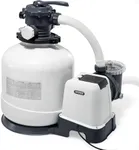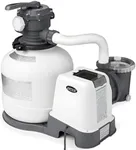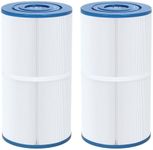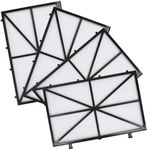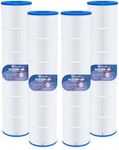Buying Guide for the Best Pool Filters
Choosing the right pool filter is essential for maintaining clean and clear water in your swimming pool. The filter helps to remove dirt, debris, and other contaminants, ensuring that your pool water remains safe and pleasant to swim in. When selecting a pool filter, it's important to consider various specifications to find the best fit for your pool's size, usage, and maintenance preferences. Here are the key specifications to consider and how to navigate them to make an informed decision.Filter TypeThere are three main types of pool filters: sand, cartridge, and diatomaceous earth (DE). Sand filters are the most common and are easy to maintain, making them suitable for most residential pools. Cartridge filters offer better filtration and are easier to clean, but they may require more frequent replacement. DE filters provide the highest level of filtration, capturing the smallest particles, but they are more complex to maintain. Choose a filter type based on your maintenance preferences and the level of filtration you need.
Flow RateThe flow rate of a pool filter, measured in gallons per minute (GPM), indicates how much water the filter can process in a given time. This is important because it determines how quickly your pool water can be cleaned. To find the right flow rate, consider the size of your pool and the pump's capacity. A higher flow rate is suitable for larger pools or pools with heavy usage, while a lower flow rate may be sufficient for smaller or less frequently used pools.
Filter AreaFilter area, measured in square feet, refers to the surface area available for filtering water. A larger filter area allows for more efficient filtration and longer intervals between cleanings. For larger pools or pools with high debris loads, a filter with a larger area is beneficial. Smaller pools or those with less debris can use filters with smaller areas. Consider your pool's size and the amount of debris it typically collects when choosing the filter area.
Maintenance RequirementsDifferent types of filters have varying maintenance needs. Sand filters require backwashing to clean, which is a relatively simple process but uses more water. Cartridge filters need to be removed and hosed down periodically, and they may need replacement every few years. DE filters require backwashing and the addition of new DE powder, which can be more involved. Consider how much time and effort you are willing to invest in maintenance when selecting a filter.
Durability and Build QualityThe durability and build quality of a pool filter are important for ensuring long-term performance and reliability. Look for filters made from high-quality materials that can withstand the elements and the chemicals used in pool maintenance. A well-built filter will last longer and require fewer repairs, providing better value over time. Consider the reputation of the manufacturer and read reviews to gauge the durability of the filter you are considering.

